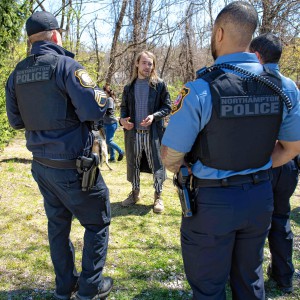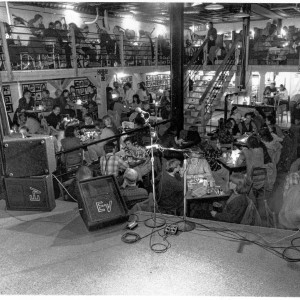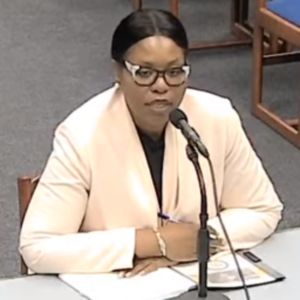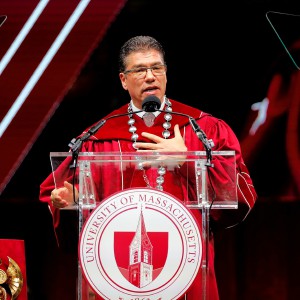Combating the crises: Northampton organizations eye ways to address mental health challenges among LGBTQ+ youth
| Published: 06-16-2023 6:25 PM |
NORTHAMPTON — The city of Northampton might seem like the ideal place for queer-identifying adolescents to grow up — after all, it was historically dubbed the “Lesbianville” of the United States by the 1992 National Enquirer tabloid.
During the pandemic, however, LGBTQ+ youth in the city were not immune to the rise in mental illness seen around the country.
“Everybody’s supportive in Northampton High School. All the teachers teach queer things, it’s great,” remarked an 18-year-old student at Northampton High School who identifies as nonbinary and whose name is being withheld to protect their privacy. During the pandemic, though, “I just felt disconnected from my friends around me because I could never see them. I think my friends felt the same way.”
Massachusetts is one of the states with the largest population density of people identifying as LGBTQ+, according to a 2018 analysis of Gallup data by the Williams Institute. Northampton in particular might be considered a safe haven for LGBTQ+ identifying young people; in 2022, the Human Rights Campaign gave Northampton a full score of 100 on its municipality equality index, which measures the amount of legal support a city provides LGBTQ+ identifying residents. In comparison, nearby Amherst and Springfield scored only 75 and 74, respectively.
However, nearly three-fourths of LGB youth and over 80% of trans youth reported symptoms of depression and anxiety in the 2021-22 Prevention Needs Assessment Survey of Hampshire County, also known as the PNAS. Administered every two years by the Strategic Planning Initiative for Families and Youth (SPIFFY), the assessment collects data from about 3,000 students in the eighth, 10th, and 12th grades across Hampshire County about their mental health and substance misuse. The same survey found an increase of poor mental health in youth since 2007, especially among LGBTQ+ youth.
Northampton officials are taking steps to combat the rise in mental health crises in LGBTQ youth. In February, Mayor Gina-Louise Sciarra announced $4 million in community recovery awards from the American Rescue Plan Act with $140,000 set aside for LGBTQ+ causes. Local organizations Transhealth and Queer Voices were among the recipients of the award, and are working to both strengthen and expand mental health services for patients.
Mental health concerns have long been on the rise among young queer people. Large existential fears on issues including climate change, gun violence, anti-trans legislation, Black Lives Matter, the war on Ukraine, are all looming over adolescents.
“There’s a bunch of bills and laws being passed that are really scary […] And I think that’s weighing on everybody’s mind right now,” said the NHS student.
Article continues after...
Yesterday's Most Read Articles
 Homeless camp in Northampton ordered to disperse
Homeless camp in Northampton ordered to disperse
 The Iron Horse rides again: The storied Northampton club will reopen at last, May 15
The Iron Horse rides again: The storied Northampton club will reopen at last, May 15
 Final pick for Amherst regional superintendent, from Virgin Islands, aims to ‘lead with love’
Final pick for Amherst regional superintendent, from Virgin Islands, aims to ‘lead with love’
 Authorities ID victim in Greenfield slaying
Authorities ID victim in Greenfield slaying
 Reyes takes helm of UMass flagship amid pro-Palestinian protests
Reyes takes helm of UMass flagship amid pro-Palestinian protests
 Police report details grisly crime scene in Greenfield
Police report details grisly crime scene in Greenfield
The COVID-19 pandemic proved to be particularly harmful to queer adolescents. In 2022, The Trevor Project’s National Survey on Youth Mental Health reported that 56% of LGBTQ youth expressed poor mental health most of the time or constantly because of the pandemic.
In Hampshire County, these numbers are higher. According to the 2021-22 PNAS, 72% of the county’s LGB youth and 82% of trans youth in the county reported experiencing symptoms of depression most days in the past year, compared to 58% of LGBTQ youth nationally. Seventy-seven percent of LGB youth and 85% of trans youth reported being anxious or nervous most days in the past year, while 73% of LGBTQ youth experienced symptoms of anxiety nationally.
On the other hand, Hampshire County performs slightly better on other mental health markers.
The Trevor Project National Survey reported that 45% of LGBTQ youth seriously considered suicide within the past year. In comparison, 37% of LGB youth and 44.7% of trans youth reported suicidality in Hampshire County.
The isolating nature of the pandemic played a large role in these trends, according to the adviser of NHS’s Gay-Straight Alliance club, Liz Skelley.
“If you’re going through a journey of identity exploration, and you’re cut off from people, that’s hard on all young people,” Skelley said. “But, if in addition, you hadn’t already developed connections with other queer-identified adults, I think that was a really dangerous time for young queer people.”
In light of this crisis, ARPA funds have been dedicated for both highlighting queer voices and addressing their increased needs in the mental health space.
Comedian and DJ Ang Buxton, who identifies as queer and nonbinary, was attracted to living in Northampton, viewing it as a queer-friendly space. Buxton, a former teacher in their early 30s originally from Springfield, received $3,800 from ARPA in support of the arts to fund Northampton comedy events. They host comedy open mics at Majestic in Northampton, an explicitly queer-friendly open mic comedy club and bar, while also traveling to perform around the country.
Buxton is focused on creating more queer spaces, giving themselves and other queer comedians the space to express themselves, to build community, and to feel safe. As someone who has struggled with mental health, Buxton understands the power of community, and feeling comfortable and safe to cultivate and express themselves artistically.
“It helps out everybody to have these integrative spaces,” Buxton said.
They hope to use their funding to host two larger-scale comedy shows for comedians of color within the next year.
Transhealth, which provides health care, research, advocacy, and education to trans and gender-diverse individuals, was awarded a $100,000 ARPA grant. The funds will be used to expand mental health services for the trans and gender-diverse community, including securing a mental health wing and hiring more mental health providers, according to Transhealth communications lead Mel DeSilva.
Since opening two years ago, the organization has maintained a steady waitlist of patients. An estimated 20,000 trans and gender-diverse people live within Transhealth’s coverage area, which includes western Massachusetts, Worcester, Albany, New York, and parts of Vermont and New Hampshire, as well as northern parts of Connecticut. The center’s comprehensive mental health team includes licensed social workers, social work interns and psychiatric nurse practitioners working to provide patients with care.
The COVID-19 pandemic prompted a loosening of state and federal rules and regulations surrounding telehealth. This change increased health care accessibility for many, particularly among vulnerable and disadvantaged populations. The use of telehealth has allowed Transhealth to expand access to essential gender-affirming health care.
Telehealth is “vitally important to the LGBTQ community, particularly the trans and gender-diverse community, especially out here [in western Massachusetts] since it is more rural. It is just easier to get care,” DeSilva noted.
Recently, along with ARPA money, Transhealth received a grant from Blue Cross Blue Shield to create “TransHealth Connect.” The program will be a resource for any health care providers working with trans and gender-diverse people to get professional consultations from Transhealth’s health care providers.
“The reality is that it shouldn’t just be Transhealth that provides trans-competent care,” DeSilva said. “Everybody should be providing trans-competent care.”
Similarly to Transhealth, Hampshire Pride, another local organization, is centered on LGBTQ+ advocacy, hosting the Northampton Pride Parade on May 6. The celebration had been brought to light for the first time since the pandemic, and attracted tens of thousands to celebrate. After three years since the last parade, the thrilling return of the Pride Parade stirs an even greater eagerness for more celebrations in the future.
“I think we need celebration [...], excitement, and really fun places to be where you can be out and open and exploring all that,” said GSA adviser Skelley. “Wear lots of rainbow stuff, and just feel really good about yourself seeing other people from the community feeling good about themselves.”
Editor’s note: This story was reported and written by students in a data journalism course at Smith College taught by writer and journalist Naila Moreira and data scientist Ben Baumer.
 Federal probe targets UMass response to anti-Arab incidents
Federal probe targets UMass response to anti-Arab incidents Locking up carbon for good: Easthampton inventor’s CO2 removal system turns biomass into biochar
Locking up carbon for good: Easthampton inventor’s CO2 removal system turns biomass into biochar William Strickland, a longtime civil rights activist, scholar and friend of Malcolm X, has died
William Strickland, a longtime civil rights activist, scholar and friend of Malcolm X, has died
